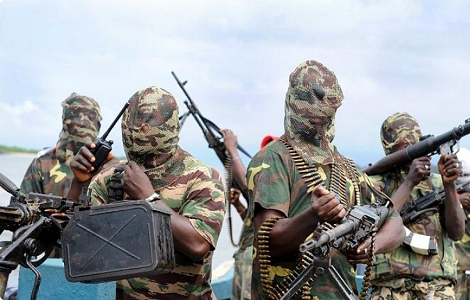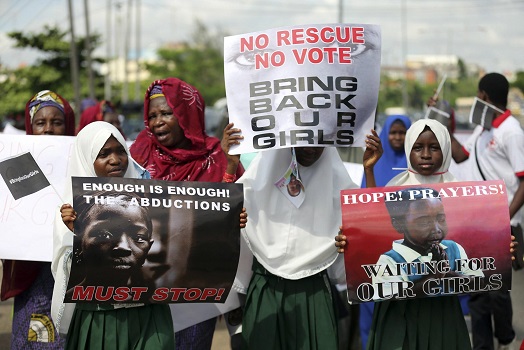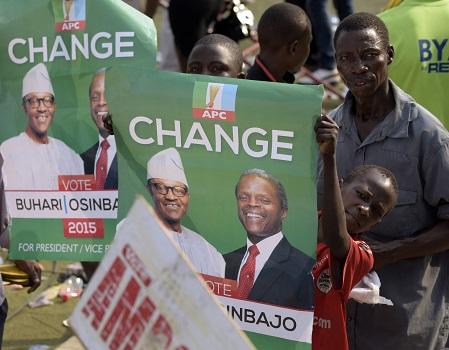Boko Haram’s modus operandi
Ever since 2009, Boko Haram has seized a number of territories and effectively threatens Nigeria’s territorial integrity. The country’s neighbours – namely Cameroon, Chad and Niger – have also been targeted by the Islamic group. Its principal activities  are attacks, suicide-bombings, executions as well as robberies. Needless to say that they have not shied away from increasingly public targets, located in the Nigerian capital, Abuja or even the United Nations Headquarters for that matter.[2] Even though Boko Haram’s objective is to establish an Islamic Caliphate and enforce Shari’ah law in and around Nigeria, victims within the Muslim community have been reported in large numbers, rounding the total estimate at more than 10,000 civilian casualties. The group’s – more often than not – lethal operations have turned the majority of the Muslim population against it, one which once – at its inception – viewed it as a viable alternative to the corrupt government. All in all, it is estimated that – as of 2015 – more than three million people are affected by the humanitarian crisis, with around 1.5 million being displaced by the violence.[3]
are attacks, suicide-bombings, executions as well as robberies. Needless to say that they have not shied away from increasingly public targets, located in the Nigerian capital, Abuja or even the United Nations Headquarters for that matter.[2] Even though Boko Haram’s objective is to establish an Islamic Caliphate and enforce Shari’ah law in and around Nigeria, victims within the Muslim community have been reported in large numbers, rounding the total estimate at more than 10,000 civilian casualties. The group’s – more often than not – lethal operations have turned the majority of the Muslim population against it, one which once – at its inception – viewed it as a viable alternative to the corrupt government. All in all, it is estimated that – as of 2015 – more than three million people are affected by the humanitarian crisis, with around 1.5 million being displaced by the violence.[3]
Boko Haram was initially set up by its original leader Mohammed Yusuf as a religious complex in the Northern territories, aiming to promote Sunni Islamic teachings and Shari’ah law. As time went by, poor Muslim families from Nigeria and its neighbours enrolled at the school.[4] The Hausa and Fulani ethnic groups – located in the areas mentioned above – consisted, and still consist, a majority within the Boko Haram followers. Although the Boko Haram crisis was initially coloured as a Muslim vs. Christian affair (with Boko Haram effectively forcing out Christian minorities from the North), the conflict soon revealed itself to be predominantly based on ethnic parameters. Hence the fact that Muslim families from Northern territories left their homes due to their Igbo ethnic heritage.[5] The concrete reason behind Boko Haram’s targeting of the North and Nigeria’s neighbours, is that they house Hausa and Fulani minorities that could readily accept the formation of an Islamic State and adhere to the group’s principles.
The group is not lacking in the financing department. Aside from looting banks and raiding towns, it has taken a page from the book of al-Qaeda in the Islamic Maghreb (AQIM), and has extorted large sums of money from politicians, diplomats and wealthy businessmen via the threat as well as the act of abduction. It is estimated that they are paid from $1,000,000 to $3,000,000 for their release (or for not being taken). Weapons are not an issue either. Since its insurrection, the more the group advanced, the more police stations and military bases were overrun.[6] Apart from deals with regional warlords, this is where most of its well-photographed arsenal of trucks and assault rifles originates. The terrorist group’s success is found in the Nigerian military’s small size of approximately 90,000 troops – compared to its population of 174 million (as a way of avoiding military coups) – and its inability to confront Boko Haram at its rise. Nigeria moved from a military dictatorship to a democracy in 1999 and started spending around 1% of the country’s budget on defence. However, corruption and poor military training have resulted in troops that are underpaid, unprepared and ill-equipped.[7] There are even reports of the troops not wearing the same uniform during battle (due to a lack of funding) or not even having the required ammunition to fight off the Boko Haram fighters.[8] Once famously considered West Africa’s strongest military, its failures were publicized internationally during the Chibok crisis of April 2014, when 276 girls were kidnapped by the terrorist group.[9] As of yet, 219 of them have not been located.
The push-back
In early 2015, Nigeria declared a state of emergency in some of its Northern states in an effort to pin down Boko Haram. The latter had ended up occupying twenty local areas (including the areas of Yobe, Borno and Adamawa), forming a territory the “size of Belgium”, and exacerbating the alarming eventuality of a state within a state. Furthermore, two months later, a joint effort with Cameroon, Niger and Chad was put into motion, in March 2015, in order to put an end to the group’s terrorist activities and its cross-country raids. More than 10,000 troops were sent, with forces in the air and on the ground making short work of the Boko Haram sites targeted.[10]
with Cameroon, Niger and Chad was put into motion, in March 2015, in order to put an end to the group’s terrorist activities and its cross-country raids. More than 10,000 troops were sent, with forces in the air and on the ground making short work of the Boko Haram sites targeted.[10]
While the Boko Haram insurgency has been ongoing and scaling up for the past six years, one needs to ponder on the reasons why the Nigerian government finally decided to step up regarding the issue. Although contained, for the most part, on the Northern and North-Eastern parts of the country, Boko Haram gradually gave way for parties of the opposition to confront the government in power through its inability to handle the years-long crisis. This factor, coupled with the upcoming elections of February 2015 (and their subsequent delay to the end of March 2015) offered the Nigerian administration and its President running for re-election Goodluck Jonathan, the much-needed and necessary incentive to take drastic measures against the Caliphate-aspiring group. It has been widely reported that mercenaries from South Africa and the former Soviet Union have joined forces with the Nigerian military against Boko Haram. Needless to say, their services are not on a discount or pro bono, while their loyalties lie with whoever pays upfront and certainly not with the Nigerian citizens’ interests.
The Islamic State linkage
For the past few years, Boko Haram had praised both the leaders of al-Qaeda and the Islamic State, Ayman al-Zawahiri and Abu Bakr al-Baghdadi, respectively. Still, the group and its leader Abubakar Shekau refrained from formally pledging allegiance to either one of them. However, the months of February and March 2015 marked a turn in Boko Haram’s place in the jihadist network.  In an effort – perhaps seeking international appeal – Boko Haram, on March 8th 2015, posted an audio recording on its Twitter account: “We announce our allegiance to the Caliph…and will hear and obey in times of difficulty and prosperity.”[11] Four days later, al-Baghdadi promptly accepted Boko Haram’s pledge and called for Islamic State supporters unable to reach Syria and Iraq to join the fight in Africa.[12] Although worldwide news agencies presented it as an out-of-nowhere turnaround, hints of the above-mentioned association could be perceived in the coming weeks to the pledge. In the beginning of 2015, Boko Haram’s videos started bearing similarities to the ones produced by the Islamic State’s network, ranging from their sudden rise in quality, a new logo, professional camerawork, to the black flag with white Arabic scripture.[13] Of course, beheadings, enslavement and the “dream” to create an Islamic Caliphate in Africa were not new to Boko Haram’s narrative, but they should be pointed out as well. The pledge and its acceptance can be explained for both parties: on the one side, Boko Haram was in need of jihadist “certification” and further media exposure, while on the other, the Islamic State wanted to reach out and extend its network in Africa. Al-Baghdadi had previously accepted pledges from groups in Afghanistan, Pakistan, Libya or Algeria (such as the Soldiers of the Caliphate), and was aiming to supplant al-Qaeda’s clout in the African continent.[14] There was no better way to achieve this than by accepting the pledge of Africa’s most well-known terrorist group in the world. The ramifications of this linkage will have little to do with Boko Haram’s ongoing quest for survival, military-wise, in the larger Nigerian region. Just because the Islamic State accepted Boko Haram’s “friend request” does not mean that they will ever meet. At best, they will use each other’s connections to further the reach of their social media presence.[15]
In an effort – perhaps seeking international appeal – Boko Haram, on March 8th 2015, posted an audio recording on its Twitter account: “We announce our allegiance to the Caliph…and will hear and obey in times of difficulty and prosperity.”[11] Four days later, al-Baghdadi promptly accepted Boko Haram’s pledge and called for Islamic State supporters unable to reach Syria and Iraq to join the fight in Africa.[12] Although worldwide news agencies presented it as an out-of-nowhere turnaround, hints of the above-mentioned association could be perceived in the coming weeks to the pledge. In the beginning of 2015, Boko Haram’s videos started bearing similarities to the ones produced by the Islamic State’s network, ranging from their sudden rise in quality, a new logo, professional camerawork, to the black flag with white Arabic scripture.[13] Of course, beheadings, enslavement and the “dream” to create an Islamic Caliphate in Africa were not new to Boko Haram’s narrative, but they should be pointed out as well. The pledge and its acceptance can be explained for both parties: on the one side, Boko Haram was in need of jihadist “certification” and further media exposure, while on the other, the Islamic State wanted to reach out and extend its network in Africa. Al-Baghdadi had previously accepted pledges from groups in Afghanistan, Pakistan, Libya or Algeria (such as the Soldiers of the Caliphate), and was aiming to supplant al-Qaeda’s clout in the African continent.[14] There was no better way to achieve this than by accepting the pledge of Africa’s most well-known terrorist group in the world. The ramifications of this linkage will have little to do with Boko Haram’s ongoing quest for survival, military-wise, in the larger Nigerian region. Just because the Islamic State accepted Boko Haram’s “friend request” does not mean that they will ever meet. At best, they will use each other’s connections to further the reach of their social media presence.[15]
Ever since the summer of 2014 and the declaration of the Islamic State of al-Baghdadi, a propaganda war has been raging between the Islamic State and al-Qaeda, with the former winning by a landslide. Both networks share the same endgame, but their means to achieve it differ vastly. Al-Qaeda aims to eventually create an Islamic Caliphate by promoting and organizing small attacks and revolutions in different parts of the world, while the Islamic State wants and has managed to occupy a territory, baptize it as its Caliphate and extend it. Essentially, one preaches for the future, while the other speaks for the here and now. This “philosophical” difference of opinion is the main point of interest that attracts both the supporters and volunteers of the Islamic State, as well the pledges coming from jihadist groups.
Despite rumours and threats of an impending attack by Boko Haram that would derail the Nigerian Presidential elections of March 31st 2015, everything went smoothly and the leader of the opposition, Muhammadu Buhari won.[16] He had been running for office on a stronger stance against Boko Haram. Although it certainly seems that the tide might be turning against the jihadist group, it is too early to assess with any certitude that its end is nigh.[17] Villages and towns in the North have been liberated, but the Nigerian military moved swiftly to other areas of interest. Furthermore, the military forces from the neighbouring countries have no desire whatsoever to remain in Nigerian territory.[18] This means that the soldiers of Boko Haram might very shortly be able to retake its fallen towns and territories, essentially leaving the country and its citizens defenceless and worse than when it all started.[19] If this very pessimistic outlook comes to fruition, the previous Nigerian administration will have taken one step forward and two steps back, effectively turning the threat of Boko Haram, as well as the latter’s affiliation with the Islamic State, into a coldly-calculated means to an end. It remains to be seen if the Buhari-led government will opt to sincerely fulfil its electoral promises.
[1] Alain Vicky, “Aux origines de la secte Boko Haram”, Le Monde Diplomatique, (April 2012).http://www.monde-diplomatique.fr/2012/04/VICKY/47604
[2] Senan Murray & Adam Nossiter, “Suicide Bomber Attacks UN Building in Nigeria”, The New York Times, (26/08/2011). http://www.nytimes.com/2011/08/27/world/africa/27nigeria.html
[3] Monica Mark,”Boko Haram’s deadliest massacre: 2,000 feared dead in Nigeria”, The Guardian, (10/01/2015). http://www.theguardian.com/world/2015/jan/09/boko-haram-deadliest-massacre-baga-nigeria
[4] Farouk Chothia, “Who are Nigeria’s Boko Haram Islamists?”, BBC, (21/01/2015). http://www.bbc.com/news/world-africa-13809501
[5] Hussein Solomon, “Boko Haram, Identity and the Limits of Counter-Terrorism”, E-International Relations, (3/11/2013). http://www.e-ir.info/2013/11/03/boko-haram-identity-and-the-limits-of-counter-terrorism/
[6] Farouk Chothia, “Boko Haram crisis: How have Nigeria’s militants become so strong?”, BBC News, (26/01/2015). http://www.bbc.com/news/world-africa-30933860
[7] Aryn Baker, “Nigeria’s Military Quails When Faced With Boko Haram”, Time, (10/02/2015). http://time.com/3702849/nigerias-army-boko-haram/
[8] Nic Robertson, “Nigerian military disorganized, under-equipped in battle against Boko Haram”, CNN, (15/01/2015). http://edition.cnn.com/2015/01/15/africa/nigeria-military-families-boko-haram/
[9] TV5 Monde, “Nigeria: Chibok, un an après le rapt des 276 lycéennes”, (26/03/2015). http://information.tv5monde.com/afrique/nigeria-un-apres-chibok-24619
[10] Laura Grossman, “Boko Haram loses ground, but remains in the fight”, The Long War Journal, (23/03/2015). http://www.longwarjournal.org/archives/2015/03/boko-haram-loses-ground-but-remains-in-the-fight.php
[11] Al-Jazeera, “Boko Haram pledges allegiance to ISIL, reports say”, (08/03/2015).http://www.aljazeera.com/news/2015/03/nigeria-boko-haram-pledges-allegiance-isil-150307201614660.html
[12] Reuters, “Islamic State leader accepts allegiance of Nigeria’s Boko Haram”, (12/03/2015).http://www.reuters.com/article/2015/03/12/us-nigeria-violence-islamicstate-idUSKBN0M82M620150312
[13] Isaac Abrak & Julia Payne,”Nigeria’s Boko Haram releases beheading video echoing Islamic State”, Reuters, (03/03/2015). http://uk.reuters.com/article/2015/03/03/uk-nigeria-violence-idUKKBN0LZ0QI20150303
[14] Daveed Gartenstein-Ross, “The Islamic State’s African Long Con”, Foreign Policy, (16/03/2015).http://foreignpolicy.com/2015/03/16/islamic-state-boko-haram-nigeria/
[15] Courrier International, “Boko Haram et l’Etat Islamique: l’alliance de la terreur”, (12/03/2015). http://www.courrierinternational.com/article/2015/03/09/boko-haram-et-l-etat-islamique-l-alliance-de-la-terreur
[16] Le Monde, “L’opposant Buhari revendique la victoire à la présidentielle au Nigeria”, (31/03/2015). http://www.lemonde.fr/afrique/article/2015/03/31/l-opposant-buhari-revendique-la-victoire-a-la-presidentielle-au-nigeria_4607040_3212.html
[17] Daniel Magnowski, “”Boko Haram’s Islamic State Pledge Seen as Sign of Weakness”, Bloomberg, (10/03/2015). http://www.bloomberg.com/news/articles/2015-03-10/boko-haram-s-islamic-state-pledge-seen-as-sign-of-weakness
[18] Adam Nossiter, “Chad Strongman says Nigeria is Absent in Fight Against Boko Haram”, The New York Times, (27/03/2015). http://www.nytimes.com/2015/03/28/world/africa/chad-strongman-says-nigeria-is-absent-in-fight-against-boko-haram.html?_r=0
[19] Courrier International, “Boko Haram perd du terrain”, (17/03/2015). http://www.courrierinternational.com/revue-de-presse/2015/03/16/boko-haram-perd-du-terrain
